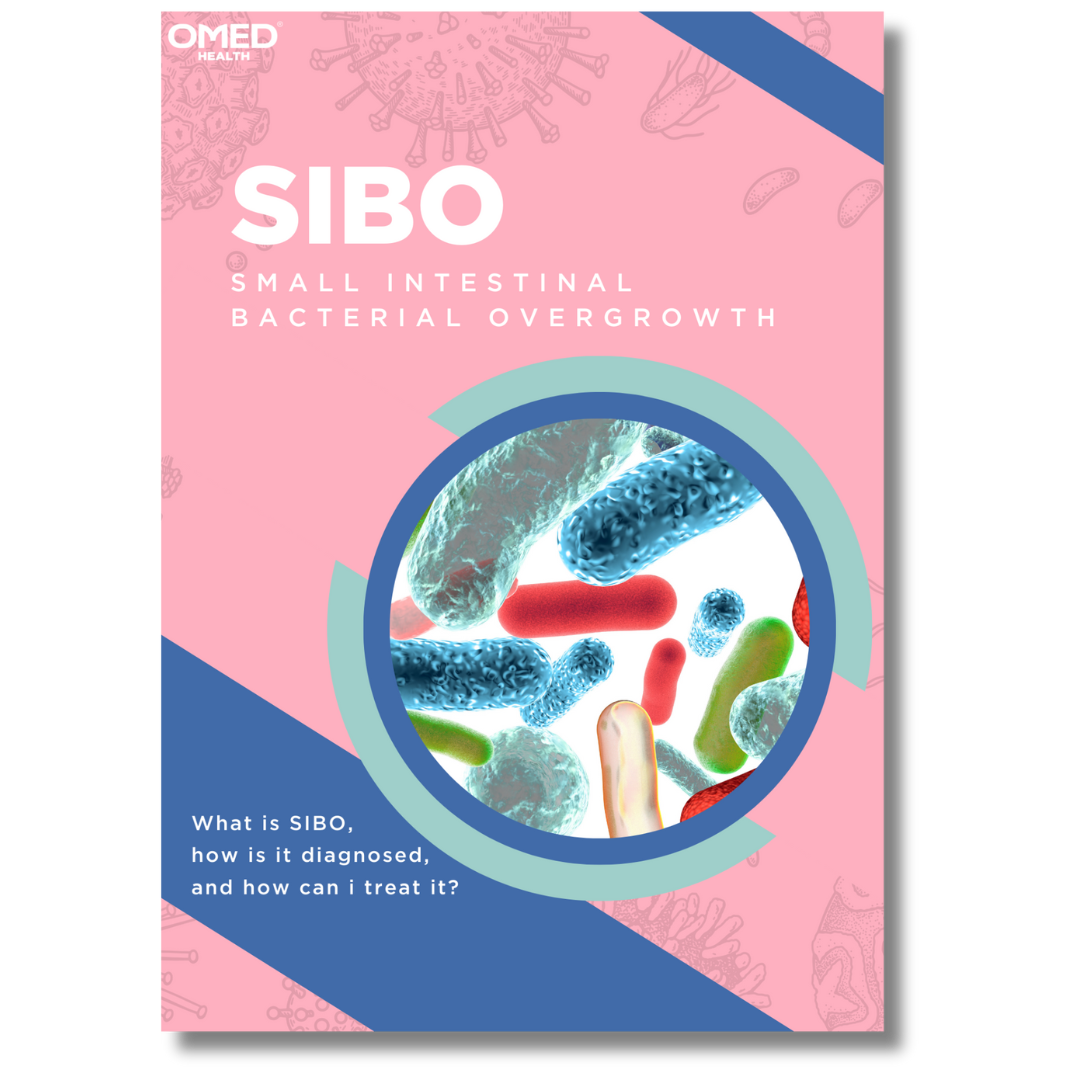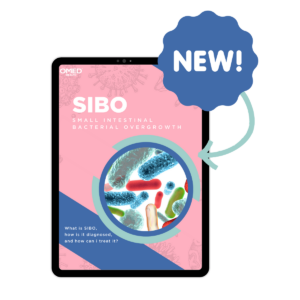Your digestive system is home to trillions of bacteria, most of which are beneficial. Gut bacteria play important roles, including producing essential vitamins (e.g., vitamin K and B group vitamins), helping to break down fibrous foods, and protecting your digestive system from pathogenic bacteria like E. coli (1). However, having too many of the wrong bacteria in the wrong place can cause digestive health problems. In this article, we’ll explore small intestine bacterial overgrowth (SIBO), a digestive issue that has been estimated to affect between 30 and 85% of patients with irritable bowel syndrome (2).
What Causes SIBO?
You may be thinking, what is SIBO, I have never heard of it! It occurs when an increased number of an abnormal type of bacteria colonize the small intestine. There is often no single clear cause of SIBO, rather that many factors impact the likelihood of it developing. This overgrowth in bacteria can develop in people with immune diseases, low stomach acid, or slow food movement through the small intestine. This condition is also a potential complication of abdominal surgery (e.g., gastric bypass) and is associated with conditions like irritable bowel syndrome, coeliac disease, liver cirrhosis, and Crohn’s disease (3).
Common SIBO symptoms include bloating, pain and cramps, indigestion, diarrhea, and constipation. Symptoms can be severe, causing daily discomfort and substantial impacts on quality of life. Dealing with gastrointestinal symptoms on a day-to-day basis can leave you feeling weak, fatigued, and affect your mental wellbeing (3). One study explored the impacts of treating SIBO on mental health, finding that after a course of antibiotic therapy, anxiety and depression scores were substantially reduced in patients (4). Over time it can even lead to malnutrition, weight loss, and micronutrient deficiencies due to decreased absorption of nutrients like iron, vitamin B12, and fat-soluble vitamins (A, D, E, and K) (3).
How to Diagnose SIBO?
Diagnosis of SIBO can be carried out in several ways. A diagnosis can be established by taking a fluid sample from your small intestine to look at the bacteria that are growing there. Although this is a useful technique to look at the type and number of bacteria, the process is very invasive, as well as time-consuming and costly. Gut bacteria can also be hard to grow and small intestinal fluid samples can easily become contaminated during collection, so this technique is not commonly performed.
Tests for SIBO are often based on breath testing. This offers a simple, non-invasive alternative for diagnosis. When bacteria have grown too high up in your intestine, fermentation of undigestible carbohydrates can start too early in digestion and characteristic amounts of hydrogen and methane can be detected in your breath. By consuming a drink containing simple carbohydrates (e.g., lactulose, glucose,) and tracking exhaled hydrogen and methane over several hours, clinicians can tell whether you have small intestinal bacterial overgrowth (5). Intestinal bacteria overgrowth tests using breath are a great option because not only is it non-invasive, but they can also be done at any time in the comfort of your own home and be conducted pre- and post-treatment.

How is SIBO treated?
Antibiotics for small intestinal bacterial overgrowth have long been the go-to treatment, aiming to restore balance by killing off the unwanted bacteria in the small intestine. However, novel SIBO treatments including probiotics (live bacteria supplements) and herbal therapy are being trialed as alternatives to antibiotics. Making alterations to your diet and lifestyle, such as reducing intake of dietary sugars and FODMAPs, taking fewer anti-inflammatory drugs like ibuprofen, and stopping smoking, can also help to alleviate symptoms (5).
We’ll discuss the different therapy approaches further in our next blog. As always, remember to discuss any treatment options with your clinician as they will be able to guide you along the most suitable treatment pathway.
How can OMED Health support your digestive health journey?
If you are living with uncomfortable digestive symptoms, taking a simple at-home breath test can help to diagnose small intestinal bacterial overgrowth. You can learn more about the tests we offer for SIBO and food intolerances here. You can also now join the waitlist to have priority access to our OMED Health Breath Analyzer and App which can help you to monitor if your SIBO treatment is working.
Resources for healthcare professionals
Do you work with patients experiencing digestive discomfort or SIBO symptoms? Learn more about how we can support you and your patients here.
References
- Katouli M. Population structure of gut Escherichia coli and its role in the development of extra-intestinal infections. Iranian Journal of Microbiology. 2010. 2(2):59-72.
- Bures et al. Small intestinal bacterial overgrowth syndrome. World Journal of Gastroenterology. 2020. 16(24):2978-2990. DOI: 3748/wjg.v16.i24.2978
- Dukowicz AC, Lacy BE, Levine, GM. Small intestinal bacterial overgrowth. Gastroenterology & Hepatology. 2007. 3(2):113-122.
- Chojnacki et al. Antimicrobial treatment improved tryptophan metabolism and mood of patients with small intestinal bacterial overgrowth. BMC Nutrition & Metabolism. 2022. 19. 66. DOI: 1186/s12986-022-00700-5.
- Ahmed JF, Padam P, Ruban A, Aetiology, diagnosis and management of small intestinal bacterial overgrowth. BMJ Frontline Gastroenterology. 2023. 14:149-154. DOI: 1136/flgastro-2022-102163.


